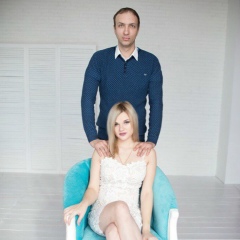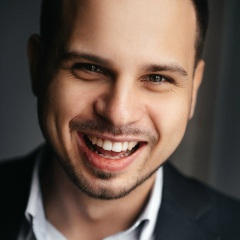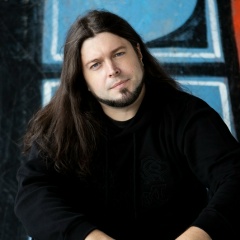https://facebook.com/298276320198577_3016854061674109
Бросил успешный бизнес ради белорусской деревни — но этот «чокнутый москвич» и там научился зарабатывать
Что получится, если за деревенскую жизнь возьмется прожженный бизнесмен? 12 лет назад Андрей Абрамов владел бизнесом в Москве — сотня сотрудников, дом за городом, личный водитель, жена и двое детей. Все это он оставил, чтобы уехать на хутор «Ёдишки» под Браславом. Зачем? Он и сам это понял только через полгода. И теперь заражает не только своей любовью к деревенской жизни, но и продуманной стратегией, как в этой жизни быть успешным.
Наш журналист Анастасия Бондарович побывала в «Ёдишках» и изучила, как сделать деревенскую жизнь развивающейся и финансово успешной, а заодно узнала личную историю «белорусского ковбоя».
Этот хутор — в трех часах езды от Минска, приезжают сюда и из более отдаленной столицы. Три дома — два для гостей и тесный «летний домик». Разнообразная живность — огромный пес, коты, козы, куры, овцы, коровы. Река — хозяин сам очищал ее, чтобы теперь купаться. Баня — душ есть не во всех домах.
Мы приезжаем к полуночи. Хозяин хутора уже спит, нас встречает его супруга — Татьяна Михайловна, как он сам к ней иногда обращается. Зато в 8 утра начинается движение: мы знакомимся с Андреем Михайловичем Абрамовым и его семилетней дочерью Настей. Они встали на ежедневную зарядку. Знакомимся и с мамой фермера — она готовит сырники на завтрак.
В Москве Андрей Абрамов был владельцем и генеральным директором российской компании, работающей в сфере торговли продуктами питания глубокой заморозки. Почему в 36 лет он начал жизнь заново? Андрей рассказал нам свою историю.
Как стать успешным на селе: стратегия
Расходы на приобретение хутора и ремонт дома для заселения, включая переезд и транспортные расходы, составили $ 21 000. Накопления «проедались», жизнь нужно было налаживать. Андрей — тогда еще новичок в белорусском законодательстве и сельской жизни — стал изучать, какие возможности есть у сельского жителя, чтобы кормить семью. Отлежавшись, уже бывший бизнесмен посмотрел на деревню как на компанию.
Одним из главных документов стал закон 2002 года «О личном подсобном хозяйстве». «Я увидел огромные преференции для сельской местности. Еще в те годы власть позаботилась о том, чтобы развивать мелкий бизнес!» — объясняет он. Согласно закону сельский житель, не считаясь предпринимателем, может реализовывать свою продукцию в месте производства либо в специально отведенных местах и иметь 4 гектара земли. Да и 4 гектарами ограничиваться не нужно — можно зарегистрировать крестьянско-фермерское хозяйство или взять землю во временное пользование. По словам Андрея, последняя практика в стране не развита вообще.
Вторым документом стал указ «О развитии агроэкотуризма» в 2007 году, который усилил предыдущий закон. Теперь сельский житель как физическое лицо имел право принимать гостей в своей хате. «Это же инструмент привлечения внимания к развитию села и монетизации сельхозпродукции! Уже не нужно тратить время на поездку на рынок, чтобы продать свой товар — можно принять гостей у себя и продать там же».
Андрей понял, как организовать пропитание своей семьи. Идея следующая: организовать личное подсобное хозяйство, затем пригласить гостей в агроусадьбу — и получить оплату аренды. Кроме того, накормить их блюдами из своих продуктов — и заработать на этом небольшую сумму плюс вызвать у них желание увезти продукты домой. Таким образом — продать намного больше, не выезжая с собственного участка. «Приехал гость — хорошо. Не приехал — вы не тратите время, а продолжаете работать на своем подсобном хозяйстве». Вдохновившись идеей, будущий фермер стал организовывать не только свою жизнь, но и жизнь всей округи.
Как фермер получал землю
Земля под ЛПХ (личное подсобное хозяйство) выделяется из земель сельхозназначения, находящихся в территориальных границах сельского совета. 25 «соток» у него было, больше никак — остальное принадлежит колхозу, а по закону взять больше земли можно только в том населенном пункте, где фермер проживает. «Это стопроцентный тупик для любого местного жителя», — смеется Андрей. В местном сельсовете можно было написать заявление о предоставлении земельного участка под ведение личного подсобного хозяйства, но, скорее всего, он получил бы отказ. Можно было попробовать убедить власть, что земля нужна, ведь физлицо планирует разводить больше скота. Но раз пока он этого не сделал, вопрос может затянуться.
Что сделал «чокнутый москвич»? Узнайте в видео: https://probusiness.io/report/5063-brosil-uspeshnyy-biznes-radi-belorusskoy-derevni-no-etot-choknutyy-moskvich-i-tam-nauchilsya-zarabatyvat.html
P.S. Присылаем лучшие посты Клуба в вашу почту. Подпишитесь сейчас → https://www.subscribepage.com/digest
(Илья Рабченок)
Из московского бизнесмена в белорусские ковбои. История хозяина хутора Ёдишки
https://probusiness.io/report/5063-brosil-uspeshnyy-biznes-radi-belorusskoy-derevni-no-etot-choknutyy-moskvich-i-tam-nauchilsya-zarabatyvat.html?utm_referrer=https%3A%2F%2Fzen.yandex.com
Бросил успешный бизнес ради белорусской деревни — но этот «чокнутый москвич» и там научился зарабатывать
Что получится, если за деревенскую жизнь возьмется прожженный бизнесмен? 12 лет назад Андрей Абрамов владел бизнесом в Москве — сотня сотрудников, дом за городом, личный водитель, жена и двое детей. Все это он оставил, чтобы уехать на хутор «Ёдишки» под Браславом. Зачем? Он и сам это понял только через полгода. И теперь заражает не только своей любовью к деревенской жизни, но и продуманной стратегией, как в этой жизни быть успешным.
Наш журналист Анастасия Бондарович побывала в «Ёдишках» и изучила, как сделать деревенскую жизнь развивающейся и финансово успешной, а заодно узнала личную историю «белорусского ковбоя».
Этот хутор — в трех часах езды от Минска, приезжают сюда и из более отдаленной столицы. Три дома — два для гостей и тесный «летний домик». Разнообразная живность — огромный пес, коты, козы, куры, овцы, коровы. Река — хозяин сам очищал ее, чтобы теперь купаться. Баня — душ есть не во всех домах.
Мы приезжаем к полуночи. Хозяин хутора уже спит, нас встречает его супруга — Татьяна Михайловна, как он сам к ней иногда обращается. Зато в 8 утра начинается движение: мы знакомимся с Андреем Михайловичем Абрамовым и его семилетней дочерью Настей. Они встали на ежедневную зарядку. Знакомимся и с мамой фермера — она готовит сырники на завтрак.
В Москве Андрей Абрамов был владельцем и генеральным директором российской компании, работающей в сфере торговли продуктами питания глубокой заморозки. Почему в 36 лет он начал жизнь заново? Андрей рассказал нам свою историю.
Как стать успешным на селе: стратегия
Расходы на приобретение хутора и ремонт дома для заселения, включая переезд и транспортные расходы, составили $ 21 000. Накопления «проедались», жизнь нужно было налаживать. Андрей — тогда еще новичок в белорусском законодательстве и сельской жизни — стал изучать, какие возможности есть у сельского жителя, чтобы кормить семью. Отлежавшись, уже бывший бизнесмен посмотрел на деревню как на компанию.
Одним из главных документов стал закон 2002 года «О личном подсобном хозяйстве». «Я увидел огромные преференции для сельской местности. Еще в те годы власть позаботилась о том, чтобы развивать мелкий бизнес!» — объясняет он. Согласно закону сельский житель, не считаясь предпринимателем, может реализовывать свою продукцию в месте производства либо в специально отведенных местах и иметь 4 гектара земли. Да и 4 гектарами ограничиваться не нужно — можно зарегистрировать крестьянско-фермерское хозяйство или взять землю во временное пользование. По словам Андрея, последняя практика в стране не развита вообще.
Вторым документом стал указ «О развитии агроэкотуризма» в 2007 году, который усилил предыдущий закон. Теперь сельский житель как физическое лицо имел право принимать гостей в своей хате. «Это же инструмент привлечения внимания к развитию села и монетизации сельхозпродукции! Уже не нужно тратить время на поездку на рынок, чтобы продать свой товар — можно принять гостей у себя и продать там же».
Андрей понял, как организовать пропитание своей семьи. Идея следующая: организовать личное подсобное хозяйство, затем пригласить гостей в агроусадьбу — и получить оплату аренды. Кроме того, накормить их блюдами из своих продуктов — и заработать на этом небольшую сумму плюс вызвать у них желание увезти продукты домой. Таким образом — продать намного больше, не выезжая с собственного участка. «Приехал гость — хорошо. Не приехал — вы не тратите время, а продолжаете работать на своем подсобном хозяйстве». Вдохновившись идеей, будущий фермер стал организовывать не только свою жизнь, но и жизнь всей округи.
Как фермер получал землю
Земля под ЛПХ (личное подсобное хозяйство) выделяется из земель сельхозназначения, находящихся в территориальных границах сельского совета. 25 «соток» у него было, больше никак — остальное принадлежит колхозу, а по закону взять больше земли можно только в том населенном пункте, где фермер проживает. «Это стопроцентный тупик для любого местного жителя», — смеется Андрей. В местном сельсовете можно было написать заявление о предоставлении земельного участка под ведение личного подсобного хозяйства, но, скорее всего, он получил бы отказ. Можно было попробовать убедить власть, что земля нужна, ведь физлицо планирует разводить больше скота. Но раз пока он этого не сделал, вопрос может затянуться.
Что сделал «чокнутый москвич»? Узнайте в видео: https://probusiness.io/report/5063-brosil-uspeshnyy-biznes-radi-belorusskoy-derevni-no-etot-choknutyy-moskvich-i-tam-nauchilsya-zarabatyvat.html
P.S. Присылаем лучшие посты Клуба в вашу почту. Подпишитесь сейчас → https://www.subscribepage.com/digest
(Илья Рабченок)
Из московского бизнесмена в белорусские ковбои. История хозяина хутора Ёдишки
https://probusiness.io/report/5063-brosil-uspeshnyy-biznes-radi-belorusskoy-derevni-no-etot-choknutyy-moskvich-i-tam-nauchilsya-zarabatyvat.html?utm_referrer=https%3A%2F%2Fzen.yandex.com
https://facebook.com/298276320198577_3016854061674109
He threw a successful business for the sake of the Belarusian village - but this “crazy Muscovite” also learned to earn money there
What happens if a burnt businessman takes up the village life? 12 years ago, Andrei Abramov owned a business in Moscow - a hundred employees, a house in the country, a personal driver, a wife and two children. He left all this to go to the Yedishki farm near Braslav. What for? He himself understood this only six months later. And now it infects not only with its love of rural life, but also with a well-thought-out strategy of how to be successful in this life.
Our journalist Anastasia Bondarovich visited Yedishki and studied how to make village life developing and financially successful, but at the same time she learned the personal story of the “Belarusian cowboy”.
This farm is a three-hour drive from Minsk, and they come here from a more distant capital. Three houses - two for guests and a cramped “summer house”. A variety of animals - a huge dog, cats, goats, hens, sheep, cows. The river - the owner himself cleaned it, so that now he can swim. Bath - a shower is not in all houses.
We arrive at midnight. The owner of the farm is already sleeping, we are met by his wife - Tatyana Mikhailovna, as he himself sometimes addresses her. But at 8 in the morning the movement begins: we get acquainted with Andrei Mikhailovich Abramov and his seven-year-old daughter Nastya. They stood up for daily exercise. We also get acquainted with the farmer’s mother - she prepares cheese cakes for breakfast.
In Moscow, Andrei Abramov was the owner and CEO of a Russian company operating in the field of deep-frozen food trade. Why at age 36 he began life anew? Andrey told us his story.
How to become successful in the countryside: strategy
The cost of acquiring a farm and repairing a house for settlement, including moving and transportation costs, amounted to $ 21,000. The accumulations were “consumed”, life had to be established. Andrei - then still a beginner in Belarusian legislation and rural life - began to study what opportunities a villager has to feed his family. Having reclined, a former businessman looked at the village as a company.
One of the main documents was the 2002 law “On personal subsidiary plots”. “I saw huge preferences for the countryside. Back in those years, the authorities made sure to develop small business! ” He explains. According to the law, a rural resident, not being considered an entrepreneur, can sell his products at the place of production or in specially designated places and have 4 hectares of land. Yes, and 4 hectares do not need to be limited - you can register a peasant farm or take land for temporary use. According to Andrey, the latest practice in the country is not developed at all.
The second document was the decree "On the development of agroecotourism" in 2007, which strengthened the previous law. Now the villager as an individual had the right to receive guests in his hut. “This is a tool to attract attention to rural development and the monetization of agricultural products! “You don’t have to spend time on a trip to the market to sell your product - you can host and sell it there.”
Andrei understood how to organize his family’s food. The idea is as follows: to organize a personal subsidiary farm, then invite guests to the farmstead - and get payment for the rent. In addition, feed them dishes from their products - and earn a small amount on this plus make them want to take the products home. Thus - to sell a lot more without leaving your own site. “The guest arrived - well. If you don’t come, you don’t waste time, but continue to work on your subsidiary farm. ” Inspired by the idea, the future farmer began to organize not only his life, but also the life of the whole area.
How a farmer received land
Land for private household plots (personal subsidiary plots) is allocated from agricultural lands located within the territorial boundaries of the village council. He had 25 "hectare", nothing more - the rest belongs to the collective farm, and by law, more land can be taken only in the village where the farmer lives. “This is an absolute dead end for any local resident,” Andrei laughs. In the local village council, it was possible to write a statement on the provision of a land plot for the conduct of personal subsidiary plots, but, most likely, he would be refused. You could try to convince the authorities that you need land, because the individual plans to raise more cattle. But since he didn’t do this, the question may drag on.
What did the “crazy Muscovite” do? Find out in the video: https://probusiness.io/report/5063-brosil-uspeshnyy-biznes-radi-belorusskoy-derevni-no-etot-choknutyy-moskvich-i-tam-nauchilsya-zarabatyvat.html
P.S. We send the best Club posts to your mail. Sign up now → https://www.subscribepage.com/digest
(Ilya Rabchenok)
From a Moscow businessman to Belarusian cowboys. The story of the owner of the farm Yedishki
https://probusiness.io/report/5063-brosil-uspeshnyy-biznes-radi-belorusskoy-derevni-no-etot-choknutyy-moskvich-i-tam-nauchilsya-zarabatyvat.html?utm_referrer=h
He threw a successful business for the sake of the Belarusian village - but this “crazy Muscovite” also learned to earn money there
What happens if a burnt businessman takes up the village life? 12 years ago, Andrei Abramov owned a business in Moscow - a hundred employees, a house in the country, a personal driver, a wife and two children. He left all this to go to the Yedishki farm near Braslav. What for? He himself understood this only six months later. And now it infects not only with its love of rural life, but also with a well-thought-out strategy of how to be successful in this life.
Our journalist Anastasia Bondarovich visited Yedishki and studied how to make village life developing and financially successful, but at the same time she learned the personal story of the “Belarusian cowboy”.
This farm is a three-hour drive from Minsk, and they come here from a more distant capital. Three houses - two for guests and a cramped “summer house”. A variety of animals - a huge dog, cats, goats, hens, sheep, cows. The river - the owner himself cleaned it, so that now he can swim. Bath - a shower is not in all houses.
We arrive at midnight. The owner of the farm is already sleeping, we are met by his wife - Tatyana Mikhailovna, as he himself sometimes addresses her. But at 8 in the morning the movement begins: we get acquainted with Andrei Mikhailovich Abramov and his seven-year-old daughter Nastya. They stood up for daily exercise. We also get acquainted with the farmer’s mother - she prepares cheese cakes for breakfast.
In Moscow, Andrei Abramov was the owner and CEO of a Russian company operating in the field of deep-frozen food trade. Why at age 36 he began life anew? Andrey told us his story.
How to become successful in the countryside: strategy
The cost of acquiring a farm and repairing a house for settlement, including moving and transportation costs, amounted to $ 21,000. The accumulations were “consumed”, life had to be established. Andrei - then still a beginner in Belarusian legislation and rural life - began to study what opportunities a villager has to feed his family. Having reclined, a former businessman looked at the village as a company.
One of the main documents was the 2002 law “On personal subsidiary plots”. “I saw huge preferences for the countryside. Back in those years, the authorities made sure to develop small business! ” He explains. According to the law, a rural resident, not being considered an entrepreneur, can sell his products at the place of production or in specially designated places and have 4 hectares of land. Yes, and 4 hectares do not need to be limited - you can register a peasant farm or take land for temporary use. According to Andrey, the latest practice in the country is not developed at all.
The second document was the decree "On the development of agroecotourism" in 2007, which strengthened the previous law. Now the villager as an individual had the right to receive guests in his hut. “This is a tool to attract attention to rural development and the monetization of agricultural products! “You don’t have to spend time on a trip to the market to sell your product - you can host and sell it there.”
Andrei understood how to organize his family’s food. The idea is as follows: to organize a personal subsidiary farm, then invite guests to the farmstead - and get payment for the rent. In addition, feed them dishes from their products - and earn a small amount on this plus make them want to take the products home. Thus - to sell a lot more without leaving your own site. “The guest arrived - well. If you don’t come, you don’t waste time, but continue to work on your subsidiary farm. ” Inspired by the idea, the future farmer began to organize not only his life, but also the life of the whole area.
How a farmer received land
Land for private household plots (personal subsidiary plots) is allocated from agricultural lands located within the territorial boundaries of the village council. He had 25 "hectare", nothing more - the rest belongs to the collective farm, and by law, more land can be taken only in the village where the farmer lives. “This is an absolute dead end for any local resident,” Andrei laughs. In the local village council, it was possible to write a statement on the provision of a land plot for the conduct of personal subsidiary plots, but, most likely, he would be refused. You could try to convince the authorities that you need land, because the individual plans to raise more cattle. But since he didn’t do this, the question may drag on.
What did the “crazy Muscovite” do? Find out in the video: https://probusiness.io/report/5063-brosil-uspeshnyy-biznes-radi-belorusskoy-derevni-no-etot-choknutyy-moskvich-i-tam-nauchilsya-zarabatyvat.html
P.S. We send the best Club posts to your mail. Sign up now → https://www.subscribepage.com/digest
(Ilya Rabchenok)
From a Moscow businessman to Belarusian cowboys. The story of the owner of the farm Yedishki
https://probusiness.io/report/5063-brosil-uspeshnyy-biznes-radi-belorusskoy-derevni-no-etot-choknutyy-moskvich-i-tam-nauchilsya-zarabatyvat.html?utm_referrer=h

У записи 2 лайков,
1 репостов,
237 просмотров.
1 репостов,
237 просмотров.
Эту запись оставил(а) на своей стене Илья Рабчёнок






















